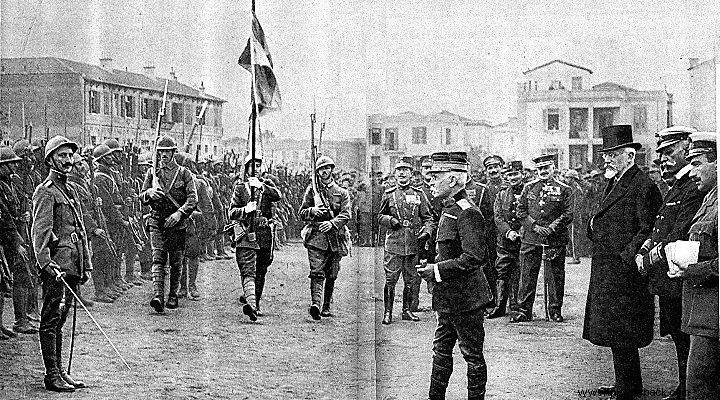
From 1915 Greece was deeply divided. On one side King Constantine and on the other Eleftherios Venizelos. Both patriots but with a different perspective of things, clashed and led Greece to destruction.
The reason was the attitude that the country had to take in the First World War. For Constantine and his entourage, Greece had to remain neutral awaiting developments until it received guarantees for its territorial integrity and compensation. This neutrality particularly benefited Germany.
For Venizelos, a more daring policy was needed, even if it resulted in the surrender of part of Eastern Macedonia to Bulgaria, as the ANTAN allies demanded, offering in exchange Asia Minor but, a little later, the union of Cyprus with Greece.
Wanting to pressurize the situation, Venizelos gave the green light to the allies to land in Thessaloniki without even informing Constantine. After this, the relationship between the two was drawn out. Constantine, also believing in German victory, insisted on neutrality, a neutrality which the presence of Franco-British forces made a travesty .
Even worse, the King did not react when the Bulgarians invaded Macedonia, captured Rupel without a fight and started slaughtering and looting. The crowning glory of the Greek humiliation was the surrender of the 4th Army Corps and its transfer to Germany.
If Constantine then had the mental fortitude to declare war against Germany and its allies Bulgaria and Turkey, today's history would be different. But he didn't have it by insisting on a stupid policy of neutrality that simply led to a stalemate.
For better or worse, since Turkey and Bulgaria were allies of the Germans, Greece could only stand up with ANTAT... All the rest were theories and dreams. Unfortunately, Greece's relations with the allies were strained. Nor, of course, were the allies, and especially the French, without blame.
Under the wretched General Saraigh, the disgraced military attaché de Roquefeigue and their co-conspirators, the French pushed the situation to the extreme by supporting Venizelos. The conflict was also fateful, on November 18, when a real battle took place in Athens between Greeks and allies with many dead on both sides.
The allies did not hesitate to impose a blockade on Greece, causing pestilence and famine. Finally they forced Constantine to resign and imposed with their lances Venizelos who had rebelled and set up the National Defense government in Thessaloniki.
After the mandatory unification of Greece, it was decided to reorganize the Greek army and participate in the war on the Macedonian Front, where until then the three divisions of the Army Corps of National Defense were fighting.
Attitude
The rebuilding of the Greek divisions of the disbanded army began slowly as public opinion in Greece had largely turned against the Allies due to the humiliations and murderous blockade. Nevertheless, the 1st Division was assembled almost without serious problems. However, the same did not happen with the XIII Division.
The division began to be mobilized in January 1918. However, on January 19 in Lamia, headquarters of the 2nd Infantry Regiment (SP), a mutinous movement broke out with leading officers. The standoff broke out at 10:00 p.m. with the rebels exiting the barracks armed and shooting in the air.
After breaking down the door of the armory, they armed other soldiers, some by force, and then went out into the city of Lamia demonstrating against Greek participation in the war. About 100 men of the XIII Mountain Artillery Squadron also joined the stand. The commander of the 2nd SP, colonel Athanasios Markos, tried to reason with the rebels but failed.
The next day, the commander of the 1st Army Corps, lieutenant general Leonidas Paraskevopoulos, and the commanding officer, lieutenant general Negropontis, together with 400 men of the 9th SP Cretans, arrived in the city. Following their intervention, the stand was suppressed in Lamia. However, many rebels had already left and marched towards Thebes. Back in Lamia, an extraordinary military court convened and sentenced to death a non-commissioned officer and a soldier who were executed for setting an example.
On January 23, a standoff also broke out in Thebes. The rebels occupied the railway station in Schimatari, cutting off the movement of trains. Thus a procession of the 9th Cretans was sent again. On January 24, the procession reached the area of Thebes where it came under fire. The mutineers, about 400, led by four officers, had deployed on adjacent heights, firing.
The Cretan squadron attacked and overthrew the mutineers, capturing many of the mutineers and the four leading officers. The next day, an emergency military court was convened that sentenced the four officers to death as well as 16 privates, including two women.
In this way the rebellious movement ended. However, the wounds of division deepened even more. This was seen in the 1920 elections and resulted in disaster in Asia Minor. The division had terrifying consequences in general for Greece, which lost Northern Epirus, lost Asia Minor, but also lost Cyprus which was granted to it.
